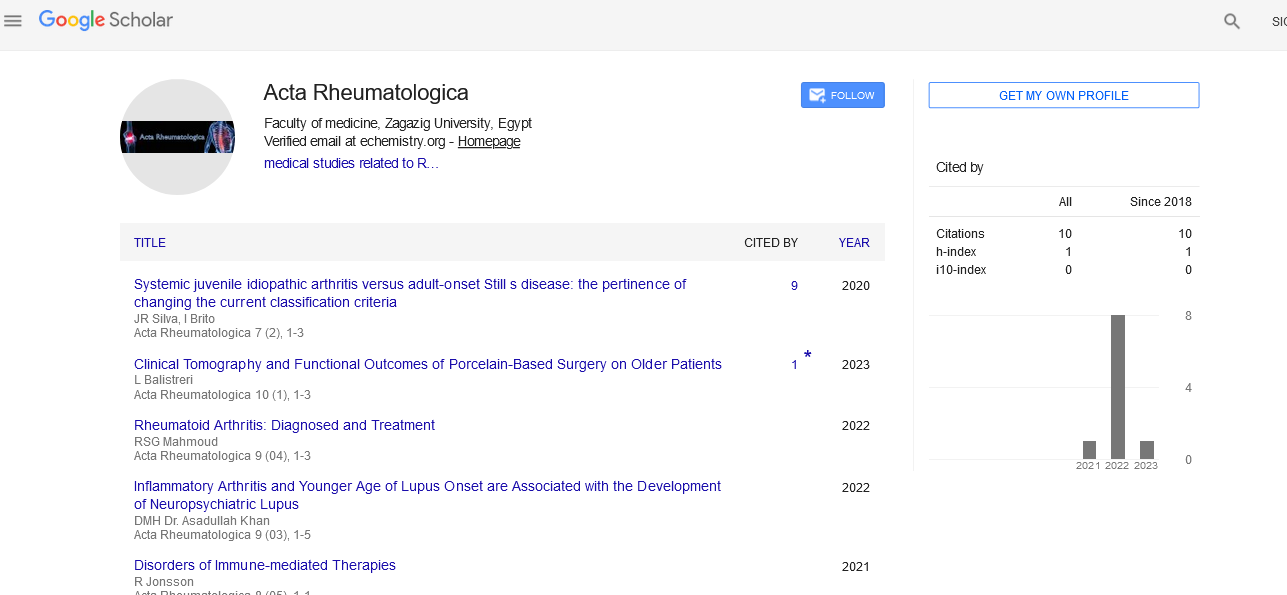Perspective - (2024) Volume 11, Issue 5
Comparative Study on Methotrexate vs. Leflunomide in Rheumatoid Arthritis
Anjali Varma*
Department of Pharmacology, Government Medical College and Hospital, Bhawanipatna, India
*Correspondence:
Anjali Varma, Department of Pharmacology, Government Medical College and Hospital, Bhawanipatna,
India,
Email:
Received: 16-Sep-2024, Manuscript No. IPAR-24-15212;
Editor assigned: 19-Sep-2024, Pre QC No. IPAR-24-15212 (PQ);
Reviewed: 03-Oct-2024, QC No. IPAR-24-15212;
Revised: 11-Oct-2024, Manuscript No. IPAR-24-15212 (R);
Published:
18-Oct-2024
Introduction
Rheumatoid Arthritis (RA) is a chronic autoimmune disorder
characterized by inflammation of the joints, leading to pain,
swelling, and potential joint damage. Effective management of
RA is essential to improve patients' quality of life and prevent
long-term disability. Two of the most commonly prescribed
Disease-Modifying Antirheumatic Drugs (DMARDs) for RA are
Methotrexate (MTX) and Leflunomide (LEF). Both medications
have distinct mechanisms of action, efficacy profiles, and safety
considerations. This article provides a comparative study of
methotrexate and leflunomide in the treatment of rheumatoid
arthritis.
Overview of methotrexate and leflunomide
Methotrexate (MTX): Methotrexate is one of the oldest and
most widely used DMARDs for RA. It acts as an antimetabolite,
inhibiting dihydrofolate reductase, an enzyme crucial for DNA
synthesis and cell proliferation. By interfering with the proliferation
of lymphocytes and the production of pro-inflammatory cytokines,
methotrexate effectively reduces inflammation and slows the
progression of joint damage.
MTX is typically administered weekly, either orally or via subcutaneous injection, and is often used as a first-line treatment
for RA. Its efficacy has been well established through numerous
clinical trials and long-term studies, making it the cornerstone of
RA management.
Leflunomide (LEF): Leflunomide is a relatively newer DMARD
that inhibits pyrimidine synthesis, thereby affecting lymphocyte
activation and proliferation. It primarily inhibits the enzyme
dihydroorotate dehydrogenase, leading to a reduction in the
availability of uridine monophosphate, which is essential for the
proliferation of activated T and B cells. Leflunomide is
administered orally and can be given as a loading dose followed
by a maintenance dose.
While leflunomide is also effective in managing RA, it is often
considered an alternative for patients who do not tolerate
methotrexate or experience inadequate responses to it.
Description
Efficacy comparison
Numerous studies have investigated the comparative efficacy
of methotrexate and leflunomide in the treatment of RA. Key
parameters often assessed include disease activity scores, joint
count assessments, and patient-reported outcomes.
Disease activity: Both MTX and LEF have shown significant
reductions in Disease Activity Scores (DAS28) over time. Some
studies suggest that methotrexate may provide a faster onset of
action compared to leflunomide. However, both treatments can
lead to substantial improvements in disease control over a
similar time frame.
Joint damage: Long-term studies indicate that both
medications effectively slow the progression of joint damage, as
evidenced by radiographic evaluations. While methotrexate has
a longer history of use and established data on radiographic
outcomes, leflunomide has also shown promising results in
preventing joint erosion.
Combination therapy: In clinical practice, MTX is often used in
combination with other DMARDs, including leflunomide, to
enhance efficacy. Studies have shown that combining these
therapies can lead to improved clinical outcomes compared to
monotherapy.
Safety profiles
The safety profiles of methotrexate and leflunomide are
important considerations when selecting a treatment plan.
Methotrexate
Methotrexate is generally well tolerated, but it can cause
adverse effects, including:
Hepatotoxicity: Elevated liver enzymes may occur, necessitating
regular monitoring.
Bone marrow suppression: This can lead to anemia, leukopenia,
and thrombocytopenia.
Gastrointestinal effects: Nausea and mucosal ulcers are
common side effects.
Pulmonary toxicity: Rarely, methotrexate can cause pneumonitis.
Leflunomide
Leflunomide is also associated with specific side effects,
including:
Hepatotoxicity: Similar to MTX, LEF can lead to elevated liver
enzymes and requires regular monitoring.
Diarrhea: Gastrointestinal issues are common with
leflunomide.
Immunosuppression: Increased risk of infections due to its
immunosuppressive action.
Teratogenicity: Leflunomide is contraindicated in pregnancy
due to potential fetal harm.
Patient preferences and quality of life
Patient preferences play a crucial role in the choice of therapy.
Factors such as route of administration, frequency of dosing,
side effect profiles, and prior experiences with medications can
influence treatment decisions.
Patients often report different experiences with MTX and LEF,
affecting their adherence to treatment. For instance, the weekly
dosing of methotrexate might be less convenient for some, while
others may prefer its established track record. Leflunomide's
daily dosing and quick onset of action can appeal to those
seeking prompt relief.
Quality of life assessments have shown improvements in both
groups, although the specific impacts can vary based on
individual experiences with side effects and the perceived
efficacy of treatment.
Conclusion
Both methotrexate and leflunomide play significant roles in
the management of rheumatoid arthritis, offering distinct
benefits and risks. Methotrexate remains the cornerstone of RA
treatment due to its long history, established efficacy, and safety
profile. Leflunomide serves as an effective alternative,
particularly for patients who cannot tolerate MTX or require
additional therapy.
When choosing between these two DMARDs, healthcare
providers should consider not only the clinical efficacy and
safety profiles but also individual patient preferences and
treatment goals. Future research is needed to further clarify the
long-term outcomes associated with these therapies and to
explore the potential for combination regimens that maximize
benefits while minimizing risks. As our understanding of RA
continues to evolve, the integration of personalized treatment
approaches will be key in improving outcomes for patients living
with this challenging condition.
Citation: Varma A (2024) Comparative Study on Methotrexate vs. Leflunomide in Rheumatoid Arthritis. Acta Rheuma Vol:11 No:5





